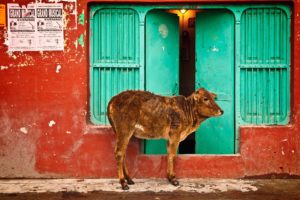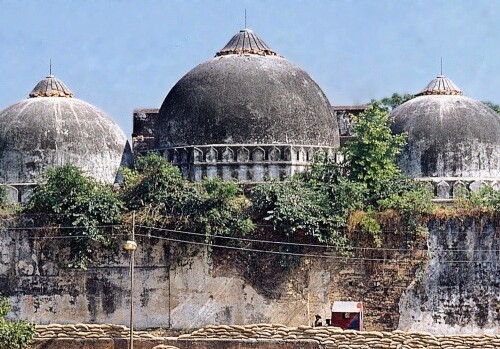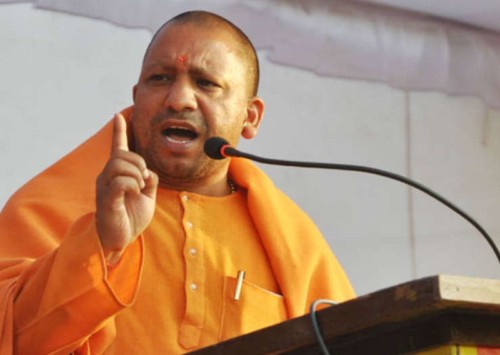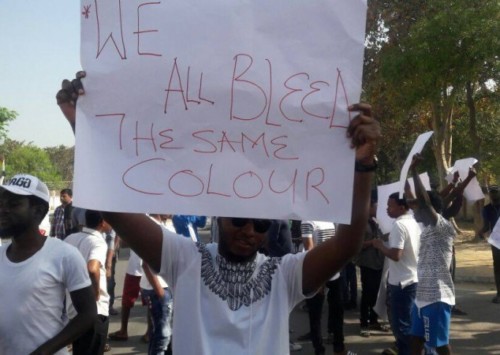Support for cow slaughter ban gaining momentum in India

The cow, considered holy by many, is an important part of the political conversation in India these days
Even as reports of mob-lynching leading to the death of a dairy farmer failed to shock a larger electorate, India’s cows are stirring sentiments among them, leading to demands for an all-India ban on cow slaughter.
The bovine species in India seem to have found an exalted status as their protection is coming at the cost of loss of lives and livelihood. In a country where extreme poverty, gender violence and corruption plague the socioeconomic fabric, the recent turn of events showcases that gau mata (or the holy mother cow) has topped the list of priorities. While Rashtriya Swayamsevak Sangh (RSS), the ideological parent of the ruling party, Bharatiya Janata Party (BJP), has demanded a ban on beef slaughter across the country, complex consequences are predicted, which call for an introspection on the need for such a ban in a country that remains the world’s largest beef exporter.
India’s most densely-populated state, Uttar Pradesh, with its newly elected government being in news for incidents of vigilantism on the name of protection of its women, among other things, has also caught the attention for inspiring protection of the gau mata, beyond its borders. Hailed as a significant move by many, the UP government’s crackdown on slaughterhouses that are reportedly illegal has led to echoing voices across the country calling for a ban on beef slaughter. Owing to sentiments of a certain section of the Hindus upholding the cow as a holy animal, representative of a mother figure of sorts, the world’s largest democracy, which prides itself on its diversity and secular nature, is facing a crucial moment in policy making. Quick to denounce religious states, such as the neighbouring Pakistan, India’s own path to creating and enacting laws has come under the scanner.
Gau-rakshaks or protectors of cows, self-styled vigilante groups, were behind to the death of a dairy farmer and injuries to others in the western state of Rajasthan recently. The victims were suspected of carrying cattle for slaughter and thereby lynched, in broad daylight. More than 25 states in India regulate and/or ban cow slaughter in varying degrees through specific laws. Mohan Bhagwat, the RSS chief, is among the most recent leaders to have spoken on this issue. “Our wish is that there should be a law against cow slaughter across India,” he said. Without adequately addressing those taking the law into their own hands, he added, “There should be no violence. It only defames efforts of cow protectors.” This comes in a series of statements and acts that are taking place across the country. The central Indian state of Chhattisgarh found its chief minister, Raman Singh promising death to those involved in cow slaughter. “We will hang those who kill cows,” he stated.
Mohan Bhagwat pitches for a nation-wide ban on cow slaughter. I have a better idea. How about a nation-wide ban on RSS? #SaffronTerrorism
— Prerna Bakshi (@bprerna) April 9, 2017
However, at a time when political parties are playing the game of polarisation, the country’s Supreme Court has intervened following a petition highlighting these events. The court has questioned six states on the role and legality of the gau rakshaks, seeking clarity and answers on why they shouldn’t be banned, as they have been reported to create disharmony among various communities and indulge in mob violence. In the event of indifference and at times reward to those taking to mob justice and disregard of other communities and individual choices, an intervention such as this can go a long way. However, even as social implications are being widely discussed, those seeking a ban on cow slaughter offer no economic reasoning or alternative to loss of livelihood that is bound to occur upon the implementation of such an arrangement.
Confused upon the cow
In the increasingly tense situation, both cow and buffalo meat are turning problematic. Industries including meat and dairy, as well as those relating to the use of such products as the leather are set to suffer if ban on the slaughter of these bovine species actually comes through. According to the United States Department of Agriculture, India is the largest exporter of bovine meat in the world, with a large consideration of this meat being buffalo meat.
Economists say banning cow slaughter is detrimental to dairy farmers and to the cow. Since when has economic logic ever stopped us?
— Nitin Pai (@acorn) April 10, 2017
Although the sensibility that the cow is not a mere commodity may be appreciable in terms of animal rights, the move to enforce a complete ban on their slaughter is far from fair for the other animals. Vegetarianism as a whole is far from being promoted, yet, one animal, holy for a few, is causing a storm. Words by George Orwell, completely unrelated, come to represent the current situation India has come to. The case for Gau Mata, as Orwell says it best, is that “All animals are equal, but some animals are more equal than others.”













